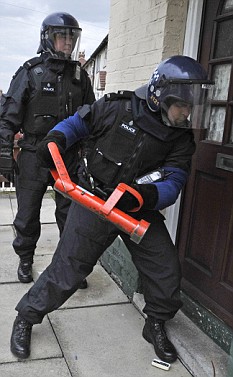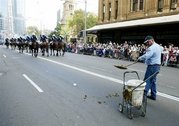
Extreme measures: There are more than 1,000 laws which give officials the right to enter private property
The march of the Big Brother state under Labour was highlighted last night as it was revealed that there are now 1,043 laws that give the authorities the power to enter a home or business.
Nearly half have been introduced since Labour came to power 11 years ago. They include the right to:
• Invade your home to see if your pot plants have pests or do not have a ‘plant passport’ (Plant Health England Order 2005).
• Survey your home and garden to see if your hedge is too high (Anti-Social Behaviour Act 2003).
• Check that accommodation given to asylum seekers is not being lived in by non-asylum seekers (Immigration and Asylum Act 1999).
• Raid a house to check if unlicensed gambling is taking place (Gambling Act 2005 Inspection Regulations 2007).
• Seize fridges without the correct energy rating (Energy Information Household Refrigerators and Freezers Regulations 2004).
The rise in clipboard-wielding state inspectors flies in the face of repeated pledges by Ministers to curb the power of bureaucrats.
The full extent of the state’s ‘powers of entry’ is revealed in documents slipped out quietly by the Government last week.
The information was posted on the Home Office website, but in a highly unusual move, the computer file was locked to prevent it being copied or printed. A secret Home Office password was required to access the file.
A Home Office spokeswoman denied the restrictions were an attempt to stop the state’s powers being circulated more widely.
She claimed it was a ‘mistake’ and the file would be unlocked tomorrow.
Read moreNow there are 1,000 laws that will let the state into your home
